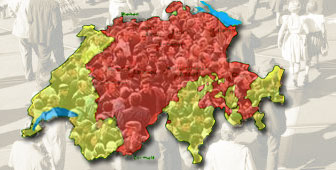
Swiss German: a dialect for the people

German is the most widely spoken language in Switzerland, but it is a far cry from the language spoken across the border in Germany.
“Schweizer Deutsch”, used by four million Swiss, is made up of a bundle of local dialects. The spoken word varies so greatly, that from the foot of the Bernese Alps to the eastern-most reaches of St Gallen, German-speaking visitors are greeted with words they do not even understand.
Even Swiss Germans’ countrymen, who speak French, Italian and Romansch in their various regions, and learn high German in school, often have a hard time understanding Schweizer Deutsch.
To begin with, there’s “Grützi”, the Swiss way of saying “hello”, and then “Auf Wiederloge” instead of the German “Auf Wiedersehen”, to say “goodbye”. But these examples merely skim the surface because the differences between Swiss German and standard German, known as high German, run deep.
Schweizer Deutsch
“Schweizer Deutsch” differs from high German in many linguistic ways, ranging from vocabulary to the formation of verbs. One distinct difference, for example, is the way the Swiss dialects treat plurals, often dropping letters from the ends of words rather than emphasising them.
There is however a general pattern when it comes to deciphering pronunciation, which once cracked, holds one of the keys to understanding the Swiss dialect.
“Many of the differences in pronunciation are systematic,” says Ingrid Hove, an assistant at Fribourg University’s department of German Linguistics. “Once you have caught on to them, you find out that it’s the same thing [with other words] so you can translate it back if you get into the habit of doing so.”
No imperfect past
Swiss German has no imperfect past tense, which means it has no way of saying, for example, “I was going to Bern”. Instead Swiss dialects use the perfect past tense which translates as either, “I have been to Bern” or “I went to Bern”.
“If we want to be more precise,” explains Hove, “we have to use words to describe exactly what we want to say.”
Added to this is the influence of French, which is the second biggest language group in Switzerland. Certain French words have permeated “Schweizer Deutsch” becoming an integral part of the dialect. It is widely accepted, for example, to say “Merci” for thank you and “Adieu” for “see you later.”
Allemanic tribes
Since the introduction of German to Switzerland in 700 AD by the Allemanic tribes of the north, Swiss German has developed into many different dialects.
The reason for this lies in the fact that it ‘s a purely spoken language with no standard written form.
Over the centuries communities used different words to describe things which were specific to their areas, so much so that someone from Basel may not have been able to understand someone from Bern.
Even today there are differences among the cantons, but since high German is the lingua franca of education, the government and the media, Swiss German speakers can understand one another in formal situations.
But at home, with friends or work colleagues, Swiss German is very much to order of the day.
“Schweizer Deutsch” is, however, more than just a dialect, it is a form of cultural identity, a way for members of the same community to “sing from the same hymn sheet.”
Conversely the language can lead to the exclusion of French and Italian-speaking Swiss, who have learned high German in school and have trouble understanding their Swiss German counterparts.
“As German speaking Swiss, we really have to try to speak high German to them. But if you want to, you can find a way to communicate in either dialect or standard German. It’s a question of goodwill.”
by Sally Mules

In compliance with the JTI standards
More: SWI swissinfo.ch certified by the Journalism Trust Initiative






























You can find an overview of ongoing debates with our journalists here . Please join us!
If you want to start a conversation about a topic raised in this article or want to report factual errors, email us at english@swissinfo.ch.